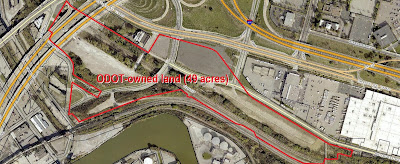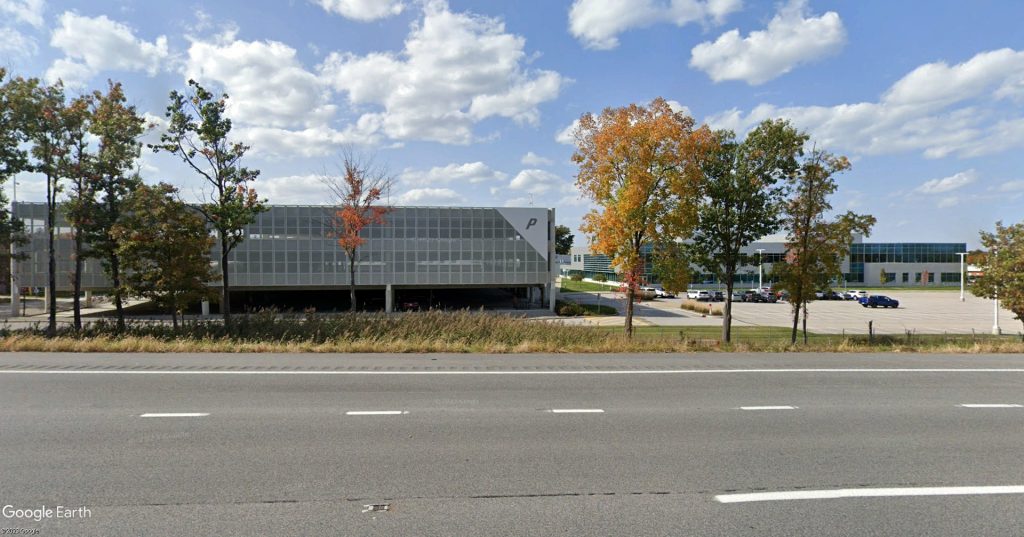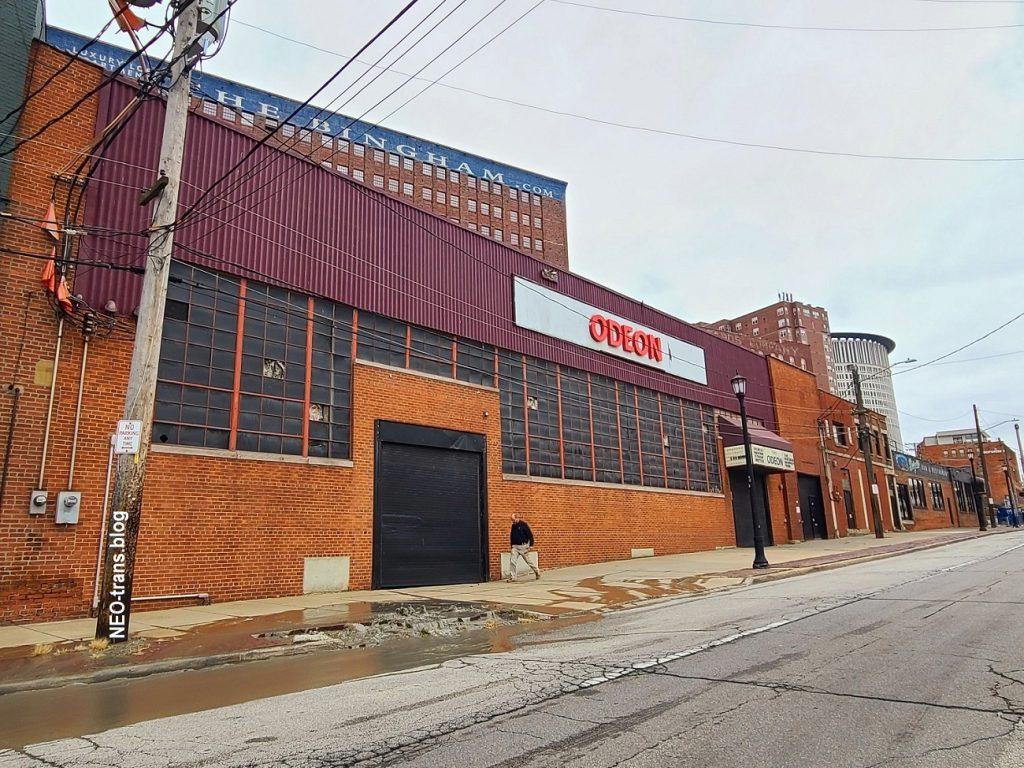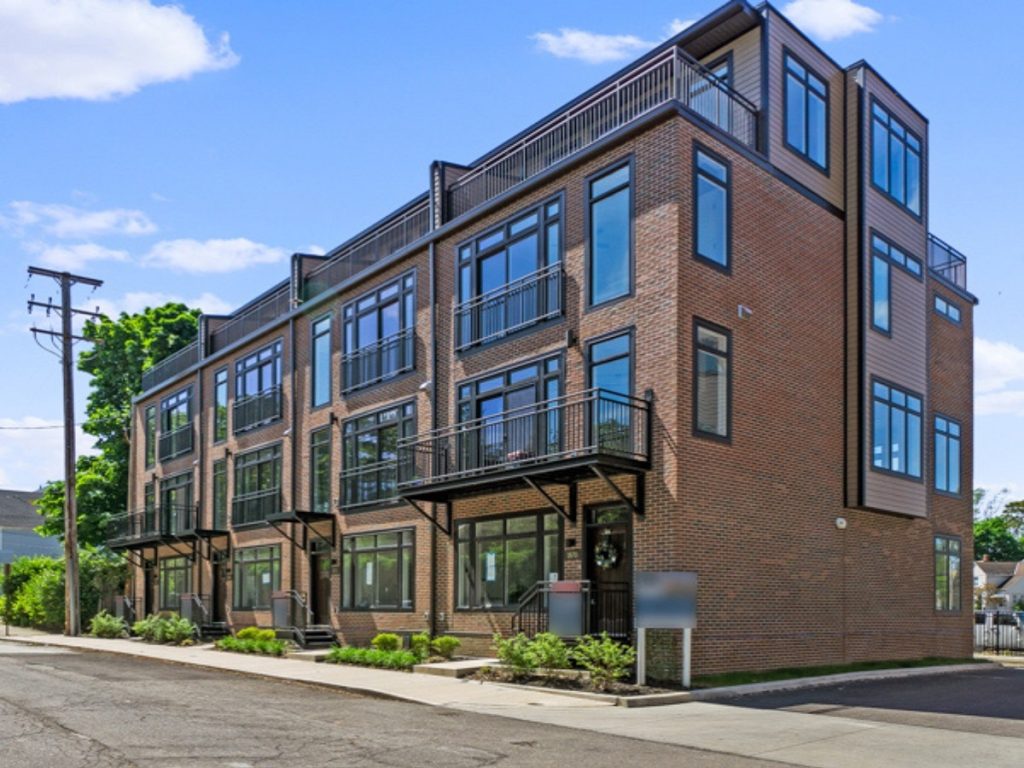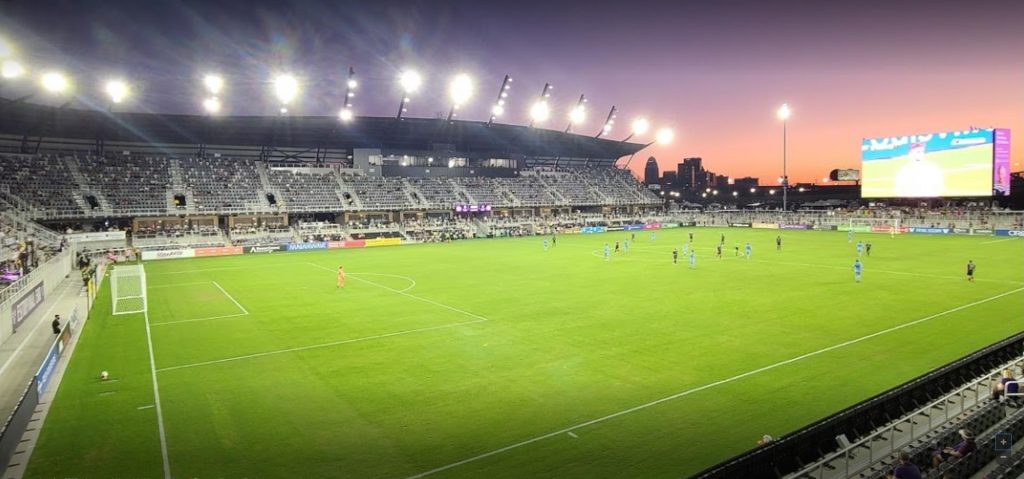 |
| Louisville’s Lynn Family Stadium, home of LouCity Football Club, opened this year under pandemic-induced social distan- cing restrictions. The $65 million stadium has 11,700 seats but is expandable to 15,304 by adding seats at the open end where the big screen is located (Devon Roberts). |
A 10,000-seat soccer stadium proposed to be built in downtown Cleveland is on hold until pandemic-hurt finances improve among backers of the project so they can acquire a site for it.
ODOT acquired the 49-acre, former Norfolk Southern Corp. intermodal rail yards in 2011 for $29.8 million to facilitate construction of the Inner Belt’s new Cuyahoga Viaduct bridges. But the preferred soccer stadium site may be less than half of that, a piece of land bounded by the Inner Belt, Ontario, Broadway Avenue, East 9th Extension and Commercial Road.
Considering that ODOT is seeing a significant reduction in gas tax revenues because of the pandemic, one would think that ODOT would be very motivated to raise revenues from non-conventional sources — such as the sale of properties it doesn’t use or intend to use in the future. Traffic on Ohio roads dropped to about 50 percent below normal levels earlier this year and while truck traffic has recovered, car traffic is still 15 percent below normal.
“Certainly as more people drive less it has impacted our budget,” Kovacs acknowledged. “However, that impact hasn’t necessitated us changing our strategy of working to obtain the best return on investment possible for the taxpayers of Ohio.”
That could include a desired buyer who is currently lacking the funds to make a targeted real estate purchase for the 10,000-seat stadium. That potential buyer may be the Gateway Economic Development Corp. of Greater Cleveland, based on an April 16 letter by U.S. Rep. Marcy Kaptur (D-9) to ODOT Director Jack Marchbanks.
“The Gateway Economic Development Corporation of Greater Cleveland, an entity with controlling ties to the City of Cleveland and Cuyahoga County is uniquely situated to own such a venue, as they have three decades of experience promoting sports, entertainment and tourism in downtown Cleveland,” Kaptur wrote.
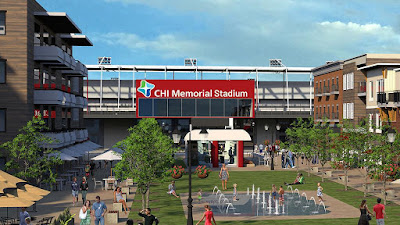 |
| Like Louisville, another United Soccer League stadium opened this year – the 8,000-seat CHI Memorial Stadium. It is part of a $150+ million mixed-use development (USL). |
The letter didn’t identify the property for the stadium but there aren’t any other underutilized ODOT-owned properties in downtown Cleveland large enough to accommodate a soccer stadium. And other persons have identified the site, including when NEOtrans first broke the story in March 2019 about the potential for a downtown soccer stadium.
“I am pleased to express my strong support for the development of a soccer-specific, multi-purpose venue in downtown Cleveland,” Kaptur added. “The use of property proposed by the Cleveland Soccer Stadium Corporation is for a public purpose and in the public interest. The addition of a 10,000-seat professional soccer venue would bring economic development opportunities that the city is poised to capitalize on.”
Kaptur is a ranking member of the House of Representatives’ Appropriations Committee which oversees all federal discretionary spending including the transportation budget. Her district extends along Lake Erie’s shore from Toledo to Cleveland.
“This (soccer stadium) proposal presents an important public use, and I urge its favorage review, consistent with your agency’s rules and regulations,” Kaptur said to ODOT’s Marchbanks.
She also said a soccer stadium of that size would facilitate the introduction of a new level of professional soccer to Cleveland and complement open-air venues the city can provide. Colleges, high schools and youth sports programs would be able to take advantage of the stadium, Kaptur added.
But Todd Greathouse, executive director of the Gateway Economic Development Corp. of Greater Cleveland, said his nonprofit organization isn’t on board yet with pursuing a soccer stadium. The corporation owns Progressive Field, home of the Cleveland Indians baseball team, and Rocket Mortgage Fieldhouse, home of the Cleveland Cavaliers basketball team, plus associated parking decks and joint development.
“This concept was brought up by the original director (of Gateway, Tom Chema) who left in 1995,” Greathouse said. “It would require a long approval process to be considered any further.”
Gateway Economic Development Corp. is funded primarily by leases paid by the Indians and Cavaliers as well as from the use of Gateway-owned parking decks and so-called sin taxes paid by persons buying alcohol and tobacco in Cuyahoga County.
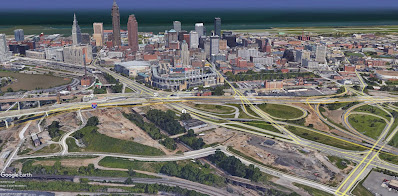 |
| Looking generally north towards towards downtown Cleveland with the ODOT-owned land and potential stadium site spread out across almost the entire bottom of the image (Google). |
“Relative to the soccer project, there really is nothing new,” Chema said. “There has been no activity.”
Constructing a 10,000-seat soccer stadium is considered essential to Cleveland landing a United Soccer League franchise. Brothers Greg and Shaw Abrams, co-owners of six Force Sports fitness centers, are teaming up with investors to find $5 million to pay the USL’s franchise expansion fee.
The effort was negatively affected when Force Sports centers were forced to close this past spring. Some programs were offered this summer, namely outdoor sports like volleyball, baseball, lacrosse, tennis and soccer. Indoor programs are restarting albeit with restrictions.
If the USL fee is paid and a stadium is provided, the team will be called the Cleveland Force. The Abrams brothers acquired the naming rights to the Force, an indoor soccer league team that thrived at the since-demolished Richfield Coliseum from 1978-88. Indoor soccer plans to return as the Cleveland Crunch in November 2021.
The Abrams have not publicly confirmed anything since NEOtrans first reported the story last year.
“Our goal is to make sure that a stadium deal can be announced at some point soon,” Greg Abrams said in the March 30, 2019 article. He said announcements will be made as soon as he gets the OK from his partners.
END

